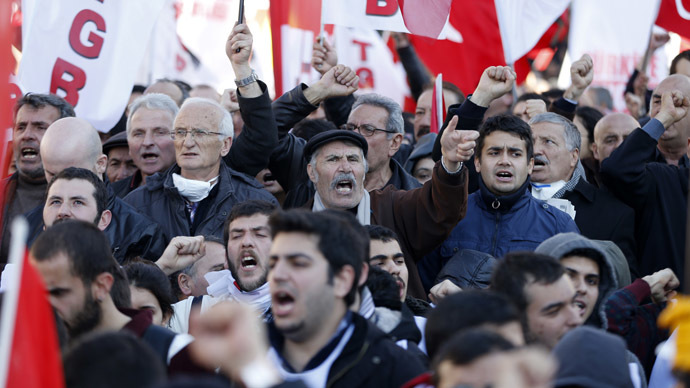Will Turkey become the new Pakistan?

As Turkey is now slowly approaching the first centenary of the Republic's foundation on 29 October 1923, some critics appear to fear that the country has assumed an outlook most incongruous with the legacy of Atatürk.
And it is true that ever since the Justice and Development Party (AKP) assumed the reins of power in the country, Turkey has moved into a distinct post-Kemalist era. Following decades of Kemalist indoctrination and a seeming hostility towards Islam, the nation is now going through a "process of completing its normalization," as voiced by Taha Özhan, the Director General of the Ankara-based non-profit research institute SETA (or Foundation for Political, Economic, and Social Research).
Kemalism" is the “ideas and principles of Mustafa Kemal Atatürk, the founder and first president of the Turkish Republic.” From The Oxford Encyclopedia of the Islamic World
Özhan sees the overtly Islamic AKP as a political power that is forcibly taking Turkey into new waters, where a pious population is made to feel at ease with the government machinery that had previously appeared to be in direct opposition to the population's deep and heartfelt attachment to Islam and its values. As such, throughout the 1920s and 30s "the ideological position of Turkish nationalism in the guise of the political doctrine of Kemalism was meant to replace the religion of Islam as the binding force fashioning a unitary and homogeneous state."
Turkey’s Westward road
The many ethnic groups making up Anatolia's Muslim population – according to the Prime Minister Recep Tayyip Erdoğan Turkey's population consists of "36 ethnic elements" – are all united under the banner of Turkish nationalism in the Kemalist nation state. The late 19th and early 20th century Ottoman state, the Turkish Republic's direct precursor, had attempted to accommodate the many Muslim refugees fleeing persecution from the Russian Empire and the Balkans on Anatolian soil, the Ottoman heartland. This exercise in social engineering saw the dispersal of the Christian minorities living in Anatolia only to be replaced by Muslim newcomers. The ideological stance of Ottomanism provided a new identity to the newly arrived settlers, who were united in their allegiance to the Ottoman Sultan-Caliph, the nominal head of all (Sunni) Muslims worldwide. Following the end of the Great War (1918) and the successful War of Resistance (1922), Mustafa Kemal Pasha sent a delegation to Lausanne to conduct peace negotiations. The subsequent treaty, signed on 24 July 1923, led to the formation of the state of Turkey on Anatolian soil – the name Turkey having been in use throughout the 19th century to refer to the Ottoman Empire. And the earlier results of the Ottoman-directed exercises in social engineering were all but confirmed by the treaty and the population exchange between Greece and Turkey, forcibly evicting and relocating Christians and Muslims and leading to the fact that by 1927 a staggering 97.4 percent of Turkey's population was Muslim (the statistic today proclaims 99.9 percent of Turks are Muslim).
As a result, the population of Anatolia emerged as an almost completely Islamic entity. But rather than identify themselves as Anatolian Muslims, Kemalist indoctrination and social engineering turned these Republican inhabitants into Turks, with their allegiance to Islam actually constituting their common bond.
The stipulations of the Treaty of Lausanne, in conjunction with the abolition of the Ottoman Sultanate (1922) and Caliphate (1924), meant that the Republic of Turkey developed into a modern nation state oriented towards the West. The Kemalist reform policies cut off modernized Turkey from its erstwhile Ottoman hinterland and Muslim neighbors. The Kemalist experiment transformed the Anatolian population, the Turkish citizens in other words, into a people cut off from their Islamic past, with access only granted to academic historians able to read the Arabic alphabet.
The new westward orientation of the country was made visible by means of the so-called Language Reform (1928), which saw the introduction of a new Latin-based script. The new Republic ensured that the traditional Islamic power class no longer wielded any power – creating the Directorate of Religious Affairs (1924), as an aggregate to the office of the Prime Minister, to control the religious institutions of the country. As a nation state, deprived of its erstwhile Islamic provinces and dependencies, the Islam practiced in Turkey became focused on the population of the territories granted in the Treaty of Lausanne. Whereas previously, the Ottoman sultans wielded nominal power over all (Sunni) Muslim peoples, the Republic's government only held sway over Turkey and the Directorate of Religious Affairs, in turn, only provided for the needs of the Turkish believers.

‘Reapplying Islam’ in the 21st century
At the moment, the AKP-led government appears to be pursuing a policy which all but strengthens the Anatolian population's Muslim identity at the expense of their "common" Turkish character. Efforts to solve the Kurdish Issue appear to underline this development.
The fact that Tayyip Erdogan's AKP-led government is currently developing policies that would strengthen the Turks' rediscovery of their Islamic heritage is illustrated by the budget passed for the fiscal year 2014. The money allocated to the Directorate of Religious Affairs has increased by 18.2 percent; the Directorate of Religious Affairs will receive around $2.5 billion, compared to the Ministry of the Interior with $1.6 billion and the Ministry of Health with $1.1 billion.
The budget passed for the year 2014 does seem to stress that Erdogan's government is at pains to provide for the spiritual and physical health of the Turkish citizenry, as befits the Muslim nanny state I talked about earlier.
When the Kemalist regime abolished the Caliphate, it also ended the office of the Chief Mufti and replaced the Shariah with the new Turkish Civil Code (Türk Medeni Kanunu) in 1926, which was adopted from the Swiss Civil Code of 1907. Many in Turkey now fear a creeping return to a more Islamic approach to law and civil rights.
On a purely academic level, the current government, employing the offices of the Committee for Higher Education, ensured in August 2013 that theology faculties will in future only teach Islam and Islamic scholarship to their students. Whereas previously, Turkish theology students also became well-versed in religious studies and even philosophy, psychology and sociology; new candidates will only receive a strict Islamic education – one that even excludes the beliefs and teachings of the Alevi minority in Turkey.
Recently, Hayrettin Karaman, a highly respected theology professor known for his close ties to the Prime Minister, published a telling article in the pro-government paper, Yeni Safak, somewhat reflecting the government's thinking. Karaman writes that pious believers in Turkey do not want full "integration with the EU," nor do they wish to "replace" their "own pure and high civilization" with that of the "West," regarding this as an "issue of faith."
These words appear as a clear challenge to the Kemalist credo, which sees the Muslim Turk as an integral part of the civilization of Europe and the West. As such, Karaman even takes his anti-nationalist stance a whole lot further, declaring that these unnamed pious believers regard the "human element [living] within the national borders [of Turkey, in other words, Turkish citizens or Turks] as an indispensable part of the great Islamic ummah [or community of believers]."
The Islamic thinker, Hayrettin Karaman, should not be understood as an obscurantist advocating the return to some kind of idealized Islamic past. Instead Karaman is a person totally at ease with today's world and enjoying the benefits of 21st-century science and technology. On the internet, for instance, he has a very distinct presence. His personal website contains over 3,500 individual webpages and provides online access to 15 of his books. In addition, his website also provides access to his articles published in various newspapers and periodicals.

Karaman does not promote a return to the past; instead he lives and works in the here and now. As such, Karaman resembles the Pakistani writer Mawlana Abul Ala Mawdudi (1903-79). As a Muslim who witnessed the fall of the Ottoman Empire and the abject failure of the Indian Khilafat Movement, in his writings, Mawdudi "provided Islamic responses, ideological and organizational, to modern society," as worded by American professor of International Affairs and Islamic Studies, John Esposito. In his analysis of the Pakistani thinker, Esposito explains further that Mawdudi saw "the West ... [as] a political and economic but also a cultural threat to Muslim societies," that Abul Ala Mawdudi was a thinker who "self-consciously reapplied Islamic sources and beliefs, reinterpreting them to address modern realities."
He put his thoughts into practice in 1941, founding the Jamaat-e-Islami in Lahore, in then-British India. Following independence and partition, Mawdudi and his Jamaat moved to West Pakistan. As an organization, the Jamaat maintains close ties with international Muslim activist groups, such as the Muslim Brotherhood. Mawdudi's organization aims at the establishment of an Islamic state, governed by the Shariah, but maintains that democracy is understood as an integral part of Islamic political ideals. When General Muhammad Zia-ul-Haq organized a coup in Pakistan on 5 July 1977, Mawdudi's ideals arguably provided the basis for the general's subsequent thorough Islamization of Pakistani society. Still, the left-liberal Pakistani journalist, Nadeem Paracha, maintains that General Zia actually "exploited" what he calls 'Maududi-ism' "as a way to deflect, deflate and denounce any other form of Islamic reformism."
The parallels outlined above could very well lead some critics of the Turkish Prime Minister Erdogan to assume that the future of Turkey appears predicated upon earlier events in Pakistan. Could it be that Turkey's Directorate of Religious Affairs and certain trusted faculties of theology are now in the process of formulating a Turkish form of Maududi-ism? Thinkers like Hayrettin Karaman are able to provide Turkey's current government with academic and legalistic ammunition to enact a wholesale shift in Turkish policy-making, thus paving the way for the Republic of Turkey to look like another version of Pakistan transported to the western edge of Asia.
The statements, views and opinions expressed in this column are solely those of the author and do not necessarily represent those of RT.
The statements, views and opinions expressed in this column are solely those of the author and do not necessarily represent those of RT.













